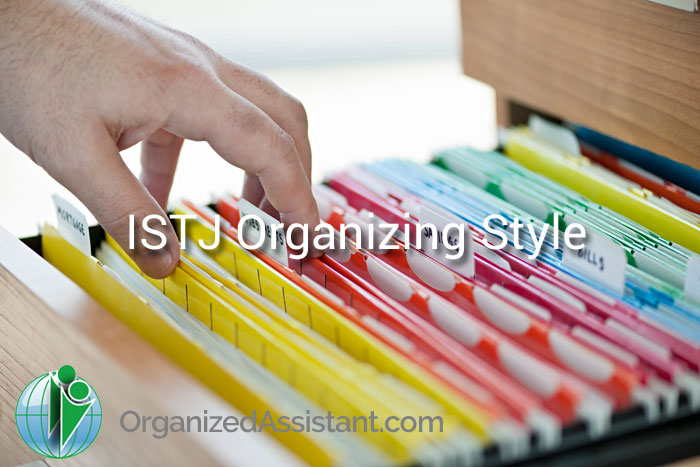ISTJ Organizing Profile
This page may contain links to Amazon.com or other sites from which I may receive commission on purchases you make after clicking on such links. Read my full Disclosure Policy

The Myers-Briggs Type Indicator® (MBTI®) can be a useful tool for exploring your clients’ relationship with time and space. Understanding why they do things the way they do can help you develop strategies that will work for them in the long run.
After researching the organizing strengths and challenges of the 16 personality types, I created an organizing profile for each type. I’m happy to share all of them with you here on Your Organizing Business, starting today with ISTJ.
ISTJ stands for Introverted – Sensing – Thinking – Judging.
ISTJ Organizing Strengths
They have well-organized bookshelves and storage space, and usually label and file information carefully. As a result, they are generally adept at finding what they need, and rarely have difficulty finding places to put things. Once they have an organizing system in place, they’re unlikely to waste time rearranging things.
ISTJs don’t tend to keep piles of unread magazines and newspapers around, and usually get rid of things which they no longer need.
In addition to having clear goals and priorities, they use a calendar system effectively, which prompts them to remember tasks and events and stay on task to finish what they start.
ISTJ Organizing Challenges
Some of the challenges identified by ISTJs as problem areas include:
- Relying too heavily on their “to do” list, and forgetting to complete tasks that aren’t on the list
- Procrastinating, when they don’t want to do something
- Hoarding items that may be useful “some day” and those with sentimental value
- Clutter resulting from not knowing where to put things, sometimes leading to a reluctance to have visitors
Due to their preference for a set schedule, they can become frustrated when something interferes with their plans.
It should be noted that because they’re naturally organized, ISTJs have high standards for organization, and don’t always feel that they are organized enough, as voiced by two survey participants.
“I am overextended and it stresses me out to be so disorganized. I have no time to GET organized.”
“I don’t have stacks of magazines like some people, but it FEELS like I have a lot of unread material sometimes.”
In addition, because of their preference for having a set schedule, they can become frustrated when something interferes with their plans.
ISTJ Time Management Systems
According to my survey, most ISTJs prefer a paper-based system. Most like the week-at-a-glance format because it allows them to visualize what they have to do. Some supplement their daily planner with a wall-mounted dry-erase board and/or calendar containing their weekly time map.
Since I conducted my research before the days of smart phones, it’s quite possible that there’s been a shift towards technology-based systems. But let me tell you something.
My type preferences are ISTJ, and despite being a long-time paper planner addict, I transitioned to electronic task management and planning tools such as Swift To-Do List and Smartsheet. Although I found them very helpful, I really missed that weekly view and have recently purchased my first paper planner in several years (I’ll tell you more about it another day).
Learn More
For more insight into the ISTJ organizing style, read about Classic Structure on Pixies Did It.
For a broader view of the ISTJ personality type, check out the following resources:
- Portrait of an ISTJ: The Duty Fulfiller
- ISTJ Personality (“The Logistician”)
- The ISTJ
- ISTJ in a Nutshell
Keep in mind that we are all unique, and even people sharing the same type preferences will not be the same in every way. Personality type is only one factor to consider when developing organizing solutions for your clients.
Are you an ISTJ?
Help others understand your personality type and organizing style by answering one or more of the following questions in the Comments:
- What are your organizing strengths?
- What are your organizing challenges or weaknesses?
- What organizing strategies work well for you?
- What are your time management strengths?
- What are your time management challenges or weaknesses?
- What time management strategies work well for you?
- What type of calendar(s) do you use?
Photo © elenathewise / depositphotos




This is going to be so much fun to go through, Janet. I’ll be interested in all of the types. This isn’t mine, but I do have elements of it. I bet I’ve had some clients in this group – the ones where I walk in for the visit and wonder why they have called me because everything looks pretty great already!
Ha ha! I once had a client who called me because he had “boxes” of stuff to be organized. You can imagine what I was thinking, but it turned out he meant cardboard magazine files – he actually had a good system; it just needed fine tuning and updating.
What an interesting series, Janet! I love how you’ve used the Myers-Briggs as a base for connecting that with organizational styles and preferences. Also important is that you stressed how unique we each are. So while all information helps to inform, we use that as a base to work from.
Can’t wait to read the rest of the series!
I’m glad you’re enjoying it! I’d published an ebook, but took it off the market because it was pretty old and had been written for individuals wanting to get organized rather than organizers. Then recently someone read a guest post I’d written which mentioned the ebook, and when they asked me about it, I realized that I was sitting on a ton of valuable information!
There is just something about a paper planner that helps me get my thoughts in the right order the first time. Maybe it’s because I started with paper when I was a kid. I’m not sure. But, it does help keep my vision of the big picture. I do like the electronic planner for recurring appointment and tasks reminders though. I can set up recurrences yearly or monthly which is valuable for not for getting tasks I do not do regularly. Thanks for sharing.
Me too – I set up recurring tasks in Outlook for anything that has to be done repeatedly.
What a great series Janet! I am an ISTJ and I could relate to everything you said! I’m definitely a paper planner and a wonderful procrastinator!! I look forward to reading the other posts in your series!!
A “wonderful” procrastinator, eh? That’s a good way of putting it! I have to admit, it’s amazing how many things I can find to do when facing something I don’t want to do.
Excellent! I have found it helpful to know my type as well as my children’s types. I can’t wait for the rest of this! Thank you!
I’ll look forward to reading your comments when I write about your type, Barbara!
I am a fellow ISTJ–so nice to be in your company!!
Likewise! 🙂